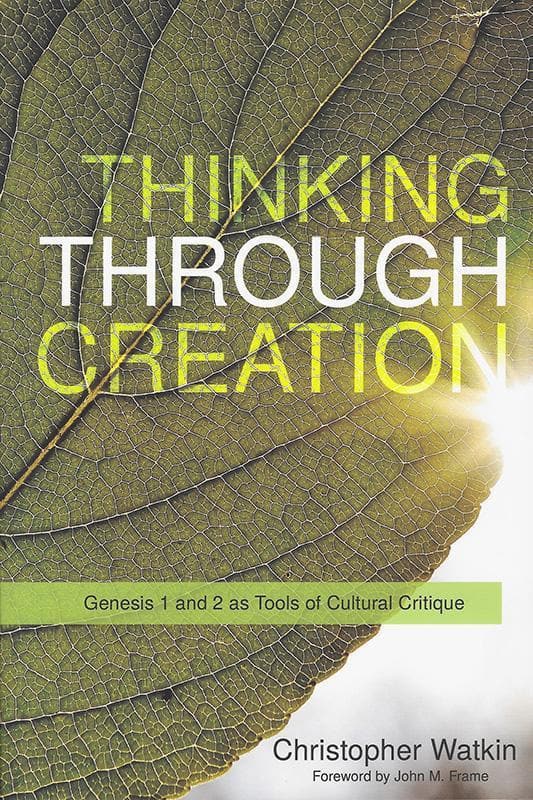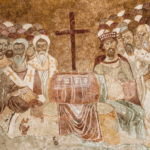Heirs and debtors of Francis Schaeffer rejoice; the tree of reformed presuppositional apologetics has put forth vigorous new shoot in the person of Christopher Watkin.
For those who just turned up their noses at that comparison, here’s something for you to rejoice in too. Watkin is the real deal: a senior lecturer at Monash university, specialising in linguistics, literature (especially French literary theory) and culture. He writes, in other words, as someone who understands and appreciates western culture from the inside. His writing is littered with quotes from the likes of Nietzsche, Saussure, Foucault, Locke, Hobbes, Heidegger and Hesiod (without losing readability).
Culture Through Theology
Watkin brings this expertise together with a profound appreciation of Scripture and historical theology. In his new book, Thinking Through Creation he offers what is essentially a protracted meditation on the implications of the Trinity and Genesis 1 and 2, with Augustine, Cornelius Van Til, Lesslie Newbigin, John Frame, Alvin Plantinga and John Milbank called in as consultants along with those already listed.

Thinking Through Creation: Genesis 1 and 2 as Tools of Cultural Critique
Christopher Watkin
Thinking Through Creation: Genesis 1 and 2 as Tools of Cultural Critique
Christopher Watkin
Reading Genesis 1 and 2, we are tempted to see only problems to solve. Yet these two chapters burst with glorious truths about God, our world and ourselves. In fact, their foundational doctrines are among the richest sources of insight as we pursue robust, sensitive, and constructive engagement with others about contemporary culture and ideas.
With deftness and clarity, Christopher Watkin reclaims the Trinity and creation from their cultural despisers and shows how they speak into, question, and reorient some of today’s most important debates.
The result is a synthesis that helps us get a better appreciation of both biblical theology and western culture. As Watkin teases out the implications of Scripture, he also helps us to see how these ideas both critique and confirm the intuitions of the contemporary world. He explains, for example:
- how the reality of the Trinity provides a richer account of love, life and meaning that the sterile abstractions of sub-personal worldviews.
- how the idea of God’s creative and communicative Word offers a bridge between the face-value world of human experience and more profound realities beyond our understanding.
- how the revelation of a God who declares things “good” overcomes the fact-value dichotomy that plagues modern philosophy and ethics;
- how the concept of the “image of God” establishes a better foundation for human dignity than contemporary alternatives;
…and so on.
Constructive Deconstruction
Watkin’s primary strategy, in establishing many of these points, is to show how biblical reality breaks the false antitheses forced on us by the competing ideologies of the secular world: beauty or utility; nature or culture; pantheism or industrialism etc. The Bible, as Watkin shows, reveals truth and error on both sides. Christian doctrine “diagonalizes”—bridges, or short-circuits, the simplistic binaries (see more on this here).
Now I’m not sure how much the terminology of “diagonalizing” adds to this third-way, synthetic approach, but the results Watkin produces with it are excellent. This isn’t simply (as is sometimes the case with postmodernism) an attempt to confound other people’s certainties. It’s a deeply productive exercise that helps us see how the Bible offers something better; how the Bible’s story and teaching can reframe the insights (and expose the limitations) of other philosophies and ethics.
I too wish I’d had access to a book that was as well-informed, theologically clear and well-written when I was starting out at university.
A Great Book for Students … and Everyone
Watkin writes in his conclusion that he has tried to write the book that he “wanted to read as an undergraduate student.” I too wish I’d had access to a book that was as well-informed, theologically clear and well-written when I was starting out at university. This is great book for students and student workers. But it’s also an excellent resource for ministers, and any Christian who wants a better understanding of the Christian worldview.
As a side note, in some evangelical quarters these days “worldview” has become a swear-word—associated with sterile intellectualism that distracts us from more affecting realities such as liturgy and community. I suspect this movement is another symptom of either-orism: we foolishly tried theory alone; now we want to give up on it and try something else alone. But at least Watkin’s fresh and detailed reflections on Scripture and culture demonstrate that we can still be stirred through our minds. Why not diagonalize by reading it in your church community?
Thinking Through Creation was written as the possible first instalment of a series of books tracking biblical and cultural themes. If the critical reception the book has received overseas is anything to go by, that series should be green-lit. And that will be a very good thing indeed.















